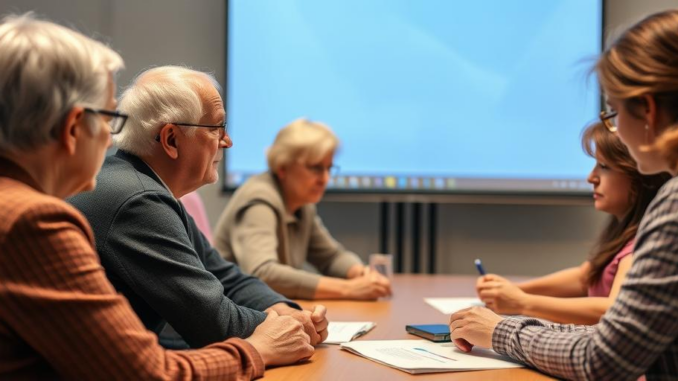
Summary
This article explores the pressing need for improved and accessible training for dementia caregivers, emphasizing the importance of understanding the disease process and adopting person-centered care approaches. It highlights the benefits of training, resources available, and future directions in dementia care training. Ultimately, better training leads to improved quality of life for both caregivers and those living with dementia.
** Main Story**
The Urgent Need for Enhanced Dementia Caregiver Training
The number of individuals living with dementia is rising globally, placing increasing demands on family members and friends who often take on the role of caregivers. Unfortunately, many caregivers lack adequate training, impacting their ability to provide effective care and maintain their own well-being. According to the Alzheimer’s Association, over 11 million Americans provide unpaid care for individuals with dementia, often without sufficient training or support. This often results in caregiver burnout, stress, and health issues. Rethinking how we train these essential caregivers is crucial.
Understanding the Dementia Journey
Effective training must start with a foundational understanding of dementia. This includes knowledge of different types of dementia, disease progression, and the impact on cognitive and behavioral abilities. Caregivers need to recognize that behaviors associated with dementia are not intentional acts of defiance but rather symptoms of the disease. This understanding helps caregivers approach challenging situations with empathy and patience. Training should encompass practical strategies for managing common behavioral challenges, such as agitation, wandering, and communication difficulties. It’s essential to recognize that caregiving is a journey with evolving needs, so training should equip caregivers to adapt their approaches as the disease progresses.
Person-Centered Care: A Focus on Individuality
Traditional caregiver training often focuses on the tasks of caregiving. While these skills remain important, a shift towards person-centered care is essential. This approach recognizes that each individual living with dementia is unique, with their own history, preferences, and abilities. Training should emphasize the importance of preserving the person’s identity and dignity, even as their cognitive abilities decline. This involves creating a supportive environment that caters to their individual needs and preferences, promoting engagement in meaningful activities, and fostering social connections. Recognizing that caregiving is a dynamic process requiring ongoing adaptation and support is key to maintaining the caregiver’s well-being, too.
Innovative Training Approaches and Resources
The digital age offers new opportunities for caregiver training. Online platforms, webinars, and mobile applications provide accessible and flexible learning options. These resources can supplement in-person training programs and support groups, which remain crucial for providing social interaction and peer support. Organizations like the Alzheimer’s Association and Positive Approach to Care offer various training programs, from basic dementia education to specialized training in communication techniques and behavior management. Additionally, some healthcare systems provide caregiver training programs integrated into the overall care plan. It’s essential for caregivers to explore available resources and find training options that best suit their needs and learning styles.
Future Directions in Dementia Care Training
The field of dementia care is constantly evolving, and training approaches must keep pace with new research and best practices. Future directions in caregiver training should incorporate advancements in technology, such as virtual reality simulations and personalized training programs. Further, training needs to address not only the practical aspects of care but also the emotional and psychological challenges faced by caregivers. Incorporating stress management techniques, self-care strategies, and access to respite care can support caregivers in maintaining their well-being throughout the caregiving journey. As our understanding of dementia deepens, training programs must adapt and expand, offering caregivers the knowledge and skills they need to provide truly person-centered and compassionate care. Finally, it is vital to advocate for greater support for caregivers within healthcare systems and communities, recognizing the crucial role they play in the lives of individuals living with dementia. Improving caregiver training ultimately benefits both the caregiver and the individual living with dementia, fostering a more supportive and enriching caregiving experience.


Virtual reality simulations for dementia care training? Now that’s innovative! Imagine experiencing the world through the eyes of someone with dementia. Talk about empathy-building! Just hope the simulations come with a “pause” button for when things get too real.
Great point about the “pause” button! It’s so important to remember that these simulations are tools for learning and empathy, and that caregivers also need support and resources to cope with the emotional demands of their role. Self-care is key! Has anyone used VR for training?
Editor: MedTechNews.Uk
Thank you to our Sponsor Esdebe
The emphasis on person-centered care is vital. How can training programs better incorporate the individual’s life history and preferences to personalize care strategies and improve the caregiver-patient relationship?
That’s a key question! Perhaps training programs could incorporate tools for actively gathering life history, like guided interviews or digital storytelling apps. Sharing these insights with the care team could ensure a more holistic and personalized approach. What are some other ways we can gather life history to improve the caregiver-patient relationship?
Editor: MedTechNews.Uk
Thank you to our Sponsor Esdebe
Given the increasing reliance on family caregivers, how can training initiatives be better incentivized and supported at a governmental or policy level to ensure wider participation and accessibility?